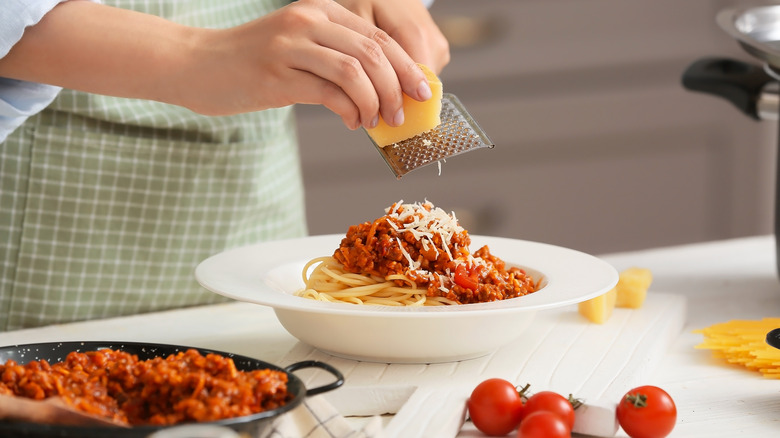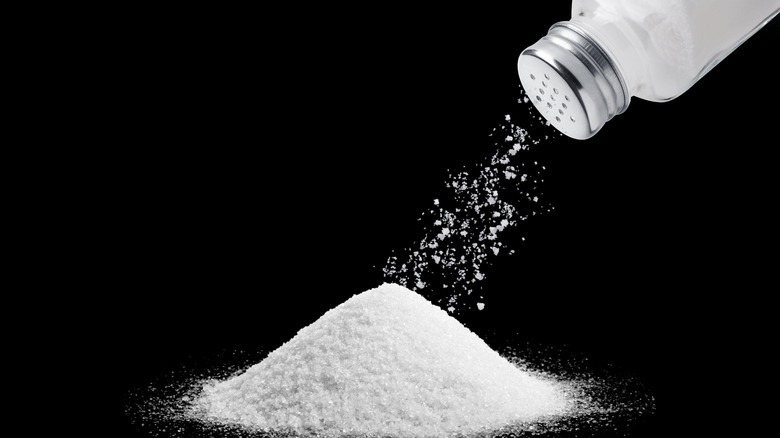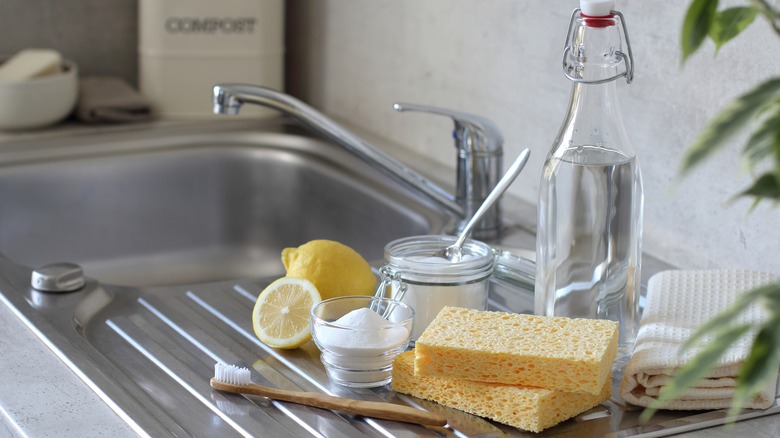The Salt Trick To Clean Stuck-On Tomato Sauce
Nothing beats a good spaghetti dinner. It's quick, easy, and a pretty filling meal for very little money. You've got fresh pasta, crusty bread, and savory tomato sauce that's the perfect combination of herbs and sugar that makes it both zesty and subtly sweet. But it's after dinner that the problem becomes obvious: Tomato sauce sticks to everything, and if you don't start washing those dishes the absolute second that dinner is over, that store-bought spaghetti sauce is going to be everywhere. Whether it's an old dinner plate or some new Tupperware, you better get used to seeing that reddish-orange tint no matter how hard you scrub.
The reason why tomato-based sauces "stain" plates and containers is a pigment in tomatoes called lycopene. As ScienceFocus explains, lycopene actually repels water rather than absorb it, thus preventing the molecules from breaking up. No matter how much water you hit your plate with, those saucy red stains will push the water off and continue to cling to the surface like dried paint.
It's for this reason that many detergent companies claim their products can easily break down even the toughest of these stains. Today tells us that such products are deemed so powerful that they can remove sauces from dishes, clothes, and even carpets. But, for those who don't want to spend money experimenting with various dish soaps to try and save a Tupperware container, there's one trick that incorporates a very common household ingredient.
Soak your dishes in salt water
Now, if you're trying to remove a greasy orange stain from the Tupperware container your mother got you as a gift, you've probably soaked it in hot water more times than you can count. And every time, it doesn't seem to work. How, then, would soaking your pans, dishes, and containers in a bath of salt water change anything? Wouldn't it be the same result?
According to Food Network, removing spaghetti sauce stains from your dishes is actually remarkably simple. Just place them in heavily salted water for about 30 minutes — but don't just lightly salt the water, add copious levels of salt to this container. After the 30 minutes are up, all you have to do is take your pans out and wash them clean, with the tomato sauce effortlessly slipping right off. In the event the tomato stains still remain on some of your dishes, you can also apply salt directly to the surface of the dish and gently scrub it clean.
As Keen Clean explains, salt has very strong dehydrating properties and has a mild abrasiveness to it. It is this combination of dehydration and abrasion, like a gentler steel wool scrub or detergent, that not only can clean stains from pans, but also from clothes as well. It is recommended, however, that you avoid this step if you're taking care of nonstick pans in order to keep from damaging and removing their coating. Luckily, there is another potential solution.
Baking soda is also good to clean with
You probably have a box of baking soda in the back of your kitchen cabinet or sitting in your refrigerator. If you have any particularly tough stains you're trying to get out of your dishes, you can use a few tablespoons of baking soda to help with that.
According to Martha Stewart, simply combine two tablespoons of baking soda, one teaspoon of water, and 1/4 teaspoon of dish soap. Allow the mixture to settle inside the food container or allow the dish you're cleaning to soak in it for 15 minutes before scrubbing it. You may have to repeat this process once or twice if the sauce stains are noticeably tough, but the end result should be a much easier clean than trying to straight scrub the sauce off with soap and water.
LiveScience tells us that baking soda has powerful cleaning properties because it is a base, which means that it can naturally break down organic materials like dirt, grime, or in this case, vegetable stains. Baking soda is also revered for being a "powerfully gentle" cleaning agent, able to cut through oily or greasy stains without damaging or staining any particularly "sensitive" pots or pans.


